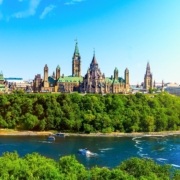How to Handle Tax on Airbnb Income in Ottawa
As the sharing economy continues to grow, more and more people are turning to platforms like Airbnb to rent out their properties and earn extra income. However, with this newfound income come tax responsibilities. If you’re renting out your property in Ottawa through Airbnb, it’s important to understand how your income will be taxed and what you need to do to stay compliant with Canadian tax laws.
Check out Airbnb Revenue Taxation in Montreal: The Ultimate Handbook.
It is interesting to know Tips for Effectively Tracking Your Airbnb Income.
Airbnb Income is Taxable in Canada
In Canada, Airbnb income is considered taxable income and must be reported on your annual tax return. This means that any money you earn from renting out your property through Airbnb is subject to the same taxes as your other sources of income, such as your salary or freelance work. The Canada Revenue Agency (CRA) considers Airbnb income to be rental income, which is taxed differently than other forms of income.
How to Report Airbnb Income on Your Tax Return
To declare rental earnings and associated expenditures on their personal tax returns, Airbnb hosts are required to fill out the T776 form, also known as the Statement of Real Estate Rentals. The distinction between rental and business revenue is determined by the Canada Revenue Agency (CRA), with the differentiation largely hinging on the array of services offered to tenants. Income is categorized as rental when only essential amenities, such as heating, lighting, parking, and laundry services are provided. Conversely, offering extra amenities might shift the categorization of the activity to a business, thereby influencing the method of income reporting.
Expenses You Can Deduct for Your Airbnb Income
One of the benefits of reporting your Airbnb income as rental income is that you can deduct certain expenses related to renting out your property. These expenses can include things like advertising and cleaning fees, insurance, repairs, and supplies. To claim these expenses, you will need to keep receipts and records of all of your expenses. This will help you accurately calculate your net rental income, which is the amount of income you have left after deducting all of your expenses.
When to Pay Taxes on Airbnb Income
In Canada, you are required to pay taxes on your Airbnb income on a quarterly basis, just like any other self-employed income. This means that you will need to make estimated tax payments throughout the year, rather than waiting until the end of the year to pay your taxes in full. To avoid penalties and interest charges, it’s important to make your estimated tax payments on time.
GST/HST
If you’re operating a business or offering short-term accommodations, it’s important to understand your obligations regarding the Goods and Services Tax/Harmonized Sales Tax (GST/HST). You’ll need to register for a GST/HST account with the Canada Revenue Agency (CRA). Once registered, adhere to the CRA’s protocols for collecting this tax from your customers, accurately reporting the amounts collected, and submitting these funds to the government according to the specified timelines. This ensures compliance and avoids potential penalties.
Navigating the Municipal Accommodation Tax
Since the start of 2018, specifically January 1st, the City of Ottawa has been enforcing a Municipal Accommodation Tax (MAT) of 5% targeting all short-term lodging services, Airbnb hosting included. This measure, endorsed by both the Province of Ontario and the Ottawa City Council, is aimed at bolstering the city’s tourism sector through significant investments in marketing and enhancing local attractions. Initially set at a 4% rate, this levy is applied directly to the cost of room bookings for durations of less than a month.
The Ottawa Gatineau Hotel Association (OGHA) has been designated the authority to manage the collection and administration of this tax, channeling the revenues towards Ottawa Tourism’s efforts. Accommodation providers are obligated to clearly list the MAT on all customer billing and forward the collected amounts to the OGHA within a 30-day timeframe after the conclusion of each month to circumvent a late payment fee pegged at 1.25% monthly.
This taxation initiative is a strategic collaboration aimed at enhancing Ottawa’s appeal as a premier travel destination year round. By drawing in over 10 million tourists annually, it plays a crucial role in enriching the city’s economic fabric.

Non-resident taxes
If you are a non-resident of Canada, you may be subject to different tax requirements. You might have to pay a withholding tax on the gross rental income, and you may also need to file a Canadian tax return.
Seek Professional Help for Tax on Airbnb Income
Dealing with a tax on Airbnb income in Ottawa can be complicated and time-consuming, especially if you’re new to the rental income tax system. If you’re unsure about how to handle your tax obligations, it’s best to seek the help of a professional. A tax expert can help you navigate the tax system, calculate your net rental income, and ensure that you’re staying compliant with all Canadian tax laws.
Penalties for Not Reporting Airbnb Income in Ottawa
Failing to report your Airbnb income on your tax return can result in significant fines and penalties from the CRA. The CRA takes tax evasion very seriously and has the power to conduct audits, freeze bank accounts, and even seize property to recover owed taxes. Additionally, if you’re found guilty of tax evasion, you may face criminal charges and a criminal record. To avoid these penalties, it’s important to accurately report your Airbnb income on your tax return and keep accurate records of all of your expenses.
How to Minimize Your Tax Liability on Airbnb Income in Ottawa
In addition to reporting your Airbnb income and deducting related expenses, there are several strategies you can use to minimize your tax liability on Airbnb income in Ottawa. For example, you can structure your rental income as a business, rather than as rental income, which may allow you to take advantage of additional tax deductions. Additionally, you can take advantage of tax-deferred retirement plans, such as RRSPs and TFSAs, to reduce your taxable income and save for the future.
It’s also important to consider your tax bracket and the marginal tax rate when planning your Airbnb income. By understanding your tax bracket and marginal tax rate, you can make strategic decisions about when to rent out your property and how much income to generate each year. This can help you minimize your tax liability and maximize your Airbnb income.
Learn more about rental income, expenses which can be deducted and other here.
Summary
Earning income from renting out your property through Airbnb in Ottawa comes with tax responsibilities. To avoid penalties and fines, it’s important to accurately report your Airbnb income on your tax return and keep accurate records of all related expenses. Additionally, by seeking professional help and utilizing strategies to minimize your tax liability, you can ensure that you’re meeting your tax obligations and maximizing your Airbnb income.
Read about Tax on Airbnb Income in Toronto: The Definitive Guide.












